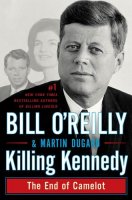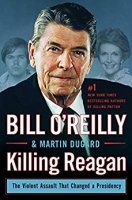
 Killing Kennedy: The End of Camelot by Bill O'Reilly and Martin Dugard (Henry Holt, 2012)
Killing Kennedy: The End of Camelot by Bill O'Reilly and Martin Dugard (Henry Holt, 2012)
Killing Reagan: The Violent Assault that Changed a Presidency by Bill O'Reilly and Martin Dugard (Henry Holt, 2015)
As I said about the book, Killing Lincoln, to open any of Bill O'Reilly's books one must to put aside one's prejudices, as he is quite a controversial figure. It's well worth the effort: these are fascinating books. I'd say it's my ignorance of history that makes them so interesting to me, but my history-buff husband enjoyed them as well.
O'Reilly's book on Lincoln treated the man as a saint; Kennedy and Reagan don't get the same courtesy, nor do any of the other presidents touched upon (Johnson, Nixon, Ford, and Carter); even Dr. Martin Luther King, Jr., is treated with blunt honesty. The books are neither exposés nor hagiographies, but appear to be well-researched efforts to paint accurate pictures of the men and their times.
The more I learn about our past presidents, the more normal Donald Trump appears. It was a great advantage to serve in the days before Twitter and incessant media coverage.
Both Killing Kennedy and Killing Reagan are easy to read and hard to put down, and I'd highly recommend them for our oldest grandchildren and one of their friends who is a great history buff—with the warning that O'Reilly pulls no punches when revealing that most of these folks (Carter being the exception) would make a tomcat blush. And because Reagan began as an actor, the cesspool nature of Hollywood high society is also revealed. You know those TV and movie actors whose characters you so admire? The Ten Commandments' prohibition of idolatry was never more pertinent.
It's not so much about sex as it is about power—sex is just one part of how the powerful get what they want. Still, as I've said before, many of the same character traits that enable people to become rich and powerful also enable them to be the high achievers we depend on. I'm learning more and more that wheat and tares grow in the same heart, and that one can be grateful for the good that people do without countenancing the harm.
Idolizing any human being is worse than futile.
I became acquainted with some of the dark underside of the Kennedy family while living in Massachusetts, but I was still shocked at what I learned through Killing Kennedy. Of Reagan I had expected less, and therefore was the more pleasantly surprised that many of his offenses diminished once he attained the White House. He seemed to rise to the occasion. Apparently one of his strengths was knowing how to surround himself with good advisors—and listening to them. Kennedy also grew noticeably during his presidency, though he was harmed by nepotism and being surrounded by too many "yes men."
I was more sparse than usual with my quotations for these books, which are better read as a whole than in snippets. Or maybe I was just lazy.
From Killing Kennedy I marked only one, which stood out because you would think it came from the book about Reagan. I cannot imagine any Democratic president or presidential candidate advocating this position now.
The president, without consulting notes, then rattles off a long list of statistics. He presses for a tax cut, to ward off a recession, he says, and backs it up with detailed financial specifics about the way in which cutting taxes would stimulate the economy. (p. 208)
The rest of the quotes are from Killing Reagan.
[Reagan's children Michael and Maureen] will long remember their father as loving but also absent from their lives for long periods of time—as was their mother. Both children are sent away to boarding school by the time they enter the second grade. "There's a distinct difference between the care provided by a parent and the care provided by a paid caretaker," Maureen will say years later. "It was simply one of the prices all of us had to pay for their success." (p. 30, emphasis mine)
Yes.
"Communism has become an intensely dogmatic and almost mystical religion, and whatever you say, they have ways of twisting it into shapes which put you in some lower category of mankind," wrote novelist and screenwriter F. Scott Fitzgerald, describing the ideological tension in Hollywood. (p. 37)
Plus ça change....
Reagan's hatred of communism has not abated one bit since his days as president of the Screen Actors Guild. If anything, his convictions have become more intense: "I think it would be very admirable if the Berlin Wall, which was built in direct contravention to a treaty, should disappear. I think this would be a step toward peace and toward self-determination for all people, if it were." (p. 80)
Reagan said that in 1967, as governor of California, just six years after the Wall's construction. Twenty-two years later the Wall will fall—due to many converging factors, but in no small part to his efforts as president of the United States.
[Reagan's] first real battle [as governor of California] came when the members of a radical group of African-Americans known as the Black Panther Party occupied the California State Capitol Building in Sacramento. In accordance with the Second Amendment to the U.S. Constitution, which allows citizens the right to bear arms, these twenty-four men and six women openly displayed the .357 Magnum pistols and 12-gauge shotguns they carried. California law states that carrying weapons openly in public is legal, and the Panthers were in Sacramento to argue against impending legislation that would revoke this right. The protest ended peacefully, but not before Republicans in the state legislature pushed through a bill that made gun control in California a reality. And it is the gun-loving Reagan himself who gladly signed the bill into law. (p. 82)
See the above quote about John F. Kennedy pushing for tax cuts!
Four years ago, Jimmy Carter did not feel it appropriate to celebrate his inauguration with even one formal ball, let alone ten. No partying for the man from Plains. Instead, Carter's 1977 inaugural address was somber, pointing out America's limitations as a nation. The tone of pessimism and defeat that marked Carter's first day in office came to define his entire presidency. If Ronald Reagan's first day in office is any indication of what is to come, the United States of America is in for a far more upbeat presidency. (p. 145)
And indeed it was true. Unlike with the other presidents, O'Reilly has a hard time finding anything negative to say about Carter as a person—though I get the impression that he did not find Carter's sexual fidelity, church attendance, and teetotal White House something to be particularly admired. But he's right about the pessimism of Carter's years in office. Carter seems to have missed what Reagan used to his advantage: both pessimism and optimism are contagious, and a good leader sets the tone for his followers. As C. S. Lewis said in The Horse and His Boy,
"For this is what it means to be a king: to be first in every desperate attack and last in every desperate retreat, and when there’s hunger in the land (as must be now and then in bad years) to wear finer clothes and laugh louder over a scantier meal than any man in your land."
[Jack Hinkley sits down with his son John, who will add this to his long list of sins and failures: he will attempt to assassinate President Reagan.] Jack is direct, telling his son that he is no longer welcome in their home. "You've broken every promise you've made to your mother and me. Our part of the agreement was to provide you with a home and an allowance while you've worked at becoming independent. I don't know what you've been doing these past months, but it hasn't been that. And we've reached the end of our rope."
John Hinckley is shocked. Even at age twenty-five, he is so accustomed to having his parents solve his problems that his father's words stun him. (p. 156, emphasis mine)
Even at age twenty-five. Clearly that was a different century, when it was considered shocking for someone to reach the age of 25 without acquiring adult skills and taking on adult responsibilities.
In defiance of Reagan, more than eleven thousand air traffic controllers ignore his warning and continue to walk the picket lines. Forty-four hours later, Reagan makes good on his promise.
They are fired.
All of them.
"I'm sorry," Reagan tells the press. "I'm sorry for them. I certainly take no joy out of this."
Later, Reagan will reflect on this day with a sense of justification. "I think it convinced people who thought otherwise that I meant what I said."
Especially the Soviets.
George Schultz, who will one day serve as Reagan's secretary of state, will call this "the most important foreign policy decision Reagan has ever made." (p. 198)
Next up? Killing Jesus. I've been hesitating over this one, the subject being far dearer to my heart than any of our presidents. Plus, the work is bound to be somewhat speculative, and therefore somewhat inaccurate, the source documents not being as plentiful as those O'Reilly has had to work with for his other books.
But it is, after all, the right time of year.


